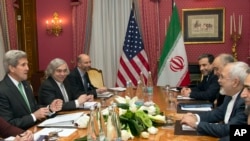U.S. President Barack Obama said when it comes to the negotiations to secure an agreement ensuring Iran does not get a nuclear weapon, the U.S. has been briefing the U.S. Congress on developments as well as Israel and other partners around the world.
Obama commented during a news conference Tuesday when asked about reports Israel spied on the nuclear talks in order to help build a case against any impending deal.
On Monday, The Wall Street Journal said Israel had been spying on the closed-door talks between Iran and the five permanent members of the U.N. Security Council and Germany, known as the P5+1.
The newspaper said senior White House officials were aware of the spying and that Israel had been sharing confidential information from the talks with members of the U.S. Congress and other officials to discourage support of any agreement with Iran.
President Obama said he would not “comment on intelligence matters in a big room full of reporters.” But in terms of any nuclear deal, he added, “there will be significant transparency on the whole process.”
State Department spokeswoman Jen Psaki said it is an “absurd notion” that the U.S. Congress would have to rely on a “foreign government” to gain insight on the Iran nuclear talks.
“We have briefed Congress on the nuclear talks as much as, or perhaps more than, any other issue since October 2013,” she said.
Negotiators near deadline
The spying allegations have surfaced at a critical time in Iran nuclear negotiations.
U.S. Secretary of State John Kerry is returning to Switzerland to resume talks on Thursday with Iranian Foreign Minister Mohammad Javad Zarif.
The parties in the nuclear talks are trying to agree on the outline of an agreement by a self-imposed deadline of March 31. They hope to have a final deal by the end of June.
If the allegations of Israeli spying are true, they are an indication of a breach in U.S.-Israeli relations, said Kelsey Davenport, the Director of Nonproliferation Policy at the Arms Control Association.
“It demonstrates a lack of trust in the United States to negotiate a deal with Iran that is in the best interest of the security of the region and that includes Israel’s security.”
Davenport added that what she found “most alarming” were the allegations that Israel has used information, obtained illicitly, to try to influence the U.S. Congress on the talks.
Israel denied allegations of spying. Defense Minister Moshe Ya’alon said "there is no way, was no way, that Israel spied on the Americans."
Congress weighs in
The top Republican in the U.S. Congress said he was “shocked” by the report of Israeli spying. House Speaker John Boehner told reporters, “there was no information revealed to me whatsoever.”
Boehner upset the Obama administration earlier this year when he side-stepped the White House and invited Israeli Prime Minister Benjamin Netanyahu to address Congress about his Iran nuclear concerns.
Netanyahu’s address, earlier this month, raised tensions between the White House and Israel. He warned U.S. lawmakers against supporting any potential agreement.
“It does not block Iran’s path to a bomb. It paves Iran’s path to a bomb,” Netanyahu said.
Days after the Israeli prime minister’s speech, 47 Republican senators sent an open letter to Iran warning that any deal might last only until President Obama's term in office ends in 2017.
Israel approaches European negotiators
This week, Israel took its concerns about the potential deal to nuclear negotiators in Britain and France, two countries that are part of the P5+1 negotiations with Iran.
"We think it is a bad deal,” said Israeli Intelligence Minister Yuval Steinitz in Paris, adding, “we have reservations about the overall approach."
Nuclear negotiators are searching for a deal that would limit Iran’s capacity to produce nuclear weapons in exchange for relief from harsh economic sanctions.
The two sides agreed to keep the details of their discussions private to try to prevent outside influences from affecting the outcome.
Israeli officials have repeatedly made statements asserting that a potential deal would not go far enough to make sure Iran would be left unable to build nuclear weapons.




